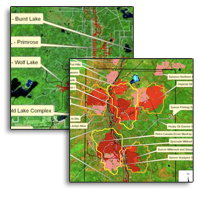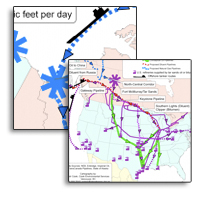Tar Sands 101
The Tar Sands "Gigaproject" is the largest industrial project in human history and likely also the most destructive. The tar sands mining procedure releases at least three times the CO2 emissions as regular oil production and is slated to become the single largest industrial contributor in North America to Climate Change.
The tar sands are already slated to be the cause of up to the second fastest rate of deforestation on the planet behind the Amazon Rainforest Basin. Currently approved projects will see 3 million barrels of tar sands mock crude produced daily by 2018; for each barrel of oil up to as high as five barrels of water are used.
Human health in many communities has seriously taken a turn for the worse with many causes alleged to be from tar sands production. Tar sands production has led to many serious social issues throughout Alberta, from housing crises to the vast expansion of temporary foreign worker programs that racialize and exploit so-called non-citizens. Infrastructure from pipelines to refineries to super tanker oil traffic on the seas crosses the continent in all directions to allthree major oceans and the Gulf of Mexico.
The mock oil produced primarily is consumed in the United States and helps to subsidize continued wars of aggression against other oil producing nations such as Iraq, Venezuela and Iran.
To understand the tar sands in more depth, continue to our Tar Sands 101 reading list
How Shell lost the goodwill of stakeholders [Enviros greenwashing Shell].
Shell: Shifting Sands
From Canadian Business magazine, July 20, 2009
How Shell lost the goodwill of stakeholders.
Enbridge pushes Clipper pipeline project
Enbridge pushes pipeline project
3 July 2009
Enbridge's oil infrastructure projects are picking up pace
The need to add capacity to North America’s oil infrastructure will be resolved with the construction of a 1,000-mile long Canada to US oil pipeline set to begin in August.
Houston-headquartered Enbridge Energy’s pipeline is part of a construction project, Alberta Clipper and Southern Lights, on two pipelines designed to match demand for greater energy security.
Resistance to Enbridge Clipper [Minnesota, Wisconsin] Growing
Opponents Try Late Rally Against Enbridge Clipper
Published July 01 2009
Duluth News Tribune
Opponents of the Enbridge Alberta Clipper pipeline rallied Tuesday in Duluth to announce they are trying legal and political efforts to stop the oil pipeline.
Marty Cobenais, with the Indigenous Environmental Network, based in Bemidji, describes the pollution and environmental destruction caused by mining tar sands in Alberta at a news conference Tuesday in Duluth.
Access and benefits negotiations with Imperial Oil stalled [DFN]
Access and benefits negotiations with Imperial Oil stalled
Roxanna Thompson
Northern News Services
Published Thursday, July 2, 2009
TTHEK'EHDELI/JEAN MARIE RIVER - Access and benefits negotiations between the Dehcho First Nation and Imperial Oil have stalled.
On June 24, DFN delegates attending the nations' annual assembly were informed by Shane Parrish that access and benefits negotiations with Imperial Oil for the Mackenzie Gas Project have hit an impasse.
"Enbridge ramps up to build" [Clipper and Southern Lights]
Enbridge ramps up to build
Published July 03 2009
Superior Telegram
Enbridge Energy is gearing up for construction of two pipelines designed to meet North American’s need for a reliable and secure energy supply.
The project includes construction of a 1,000-mile long, 36-inch diameter pipeline from Alberta, Canada, to Superior; the line includes 326 miles to be constructed in the U.S., capable of carrying 450,000 barrels per day from the oil sands in Canada to its terminal in Superior.
"Looking beyond Yellowknife"
Looking beyond Yellowknife
Guy Quenneville
Northern News Services
Published Wednesday, July 1, 2009
SOMBA K'E/YELLOWKNIFE - Patrick Doyle has been elected president of the Yellowknife Chamber of Commerce at a gloomy time for the city, and he's casting his net beyond Yellowknife.
Alberta's Conservatives well past their due-date
Alberta's Conservatives well past their due-date
Published July 2, 2009 by Fast Forward Weekly reader in Letters
After Alberta Finance Minister Iris Evans’s misguided remarks about how mothers should stay home to raise young children (ignoring social and economic reality), it was hard to see how Conservative obliviousness about Albertans’ contemporary values could be made clearer. But Edmonton-Calder’s Conservative MLA Doug Elniski has topped his colleague with his repulsively sexist remarks on the web.
IEA still sees major role for Canadian tar sands
IEA still sees major role for Canadian oil sands
Peter O’Neil, Canwest News Europe Correspondent, Canwest News Service
Monday, June 29, 2009
The Canadian oil sands “appears to be the sector hardest hit by the recession and the sharp fall in oil prices,” the Paris-based agency said in a report assessing the impact of the economic crisis on the world’s oil and gas supplies.
PARIS -- The Canadian oil sands sector is "down but not out" in its role as a major and secure safety net in the global energy market, the International Energy Agency reported Monday.
Proposed law would allow co-operation in energy purchasing (Tar Sands)
Proposed law would allow co-operation in energy purchasing
Energy firms would be able to consult each other on project timing, to allow them to balance spending and help prevent cost overruns.
NATHAN VANDERKLIPPE
CALGARY —
Tuesday, Jun. 30, 2009
Globe and Mail.
Canada's energy giants could be allowed to consult each other on new oil sands projects, a key change that would give them greater purchasing power to help prevent cost overruns and speed construction timelines.
Book documents discarding of three decades of tar sands knowledge
Book documents discarding of three decades of oilsands knowledge
By Darcy Henton, Edmonton Journal
June 29, 2009
Some might call it '32 lost years.'
When Edmontonian Larry Pratt wrote his book Tarsands in 1976, he warned Albertans about the environmental, social and economic ramifications of rapid development of the oilsands, north of Fort McMurray. Thirty-two years later, Calgarian Andrew Nikiforuk provides in shocking detail in his book, also called Tarsands, just where that frenzied development has got us.
It raises the question: Where was everybody during those three decades?



